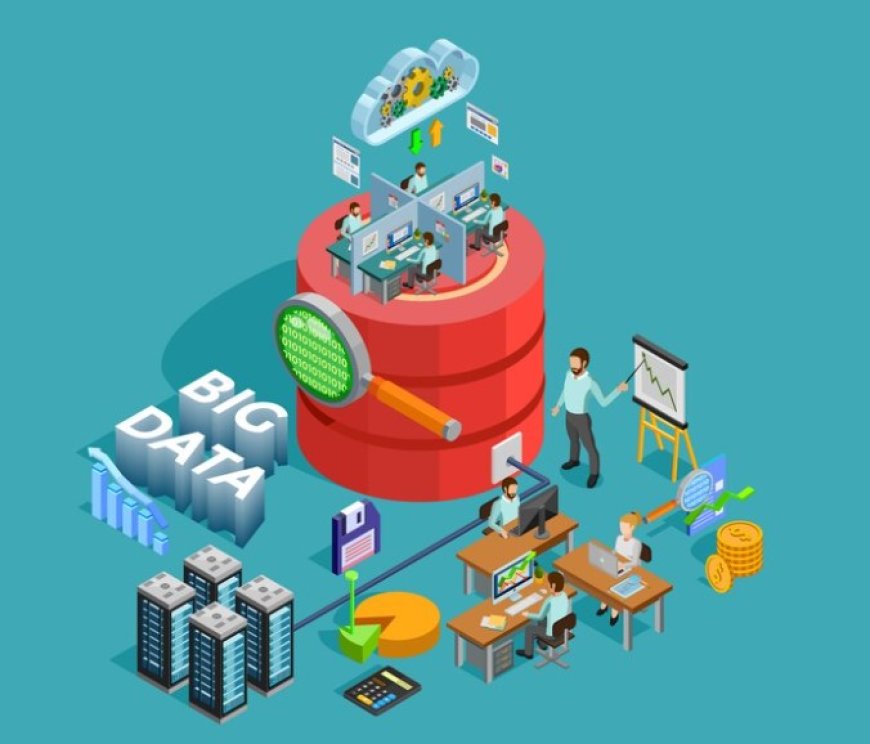The Impact of Cloud Computing on Data Analytics and Big Data
Explore the profound Impact of Cloud Computing on Data Analytics and Big Data. Discover how the cloud revolutionizes data processing for enhanced insights.

The introduction provides a concise overview of cloud computing, highlighting its pivotal role in modern computing infrastructure. It emphasizes the paramount importance of data analytics and big data in today's data-driven world. This section sets the stage for a comprehensive exploration of how cloud computing has revolutionized the way organizations handle and derive insights from vast volumes of data.
Cloud computing
Cloud computing, a transformative technology, has reshaped the landscape of data analytics and big data. It refers to the delivery of computing services, such as storage, processing, and networking, over the internet. Instead of relying on local infrastructure, organizations can leverage remote data centers to access powerful computing resources. This paradigm shift has far-reaching implications for data analysis, enabling more efficient processing, scalability, and accessibility, ultimately enhancing the capabilities of data analytics and handling vast amounts of big data.
Significance of data analytics and big data
Data analytics and big data play a pivotal role in today's digital age, offering profound significance across various domains. These disciplines empower organizations to extract invaluable insights from vast and complex datasets. By analyzing patterns and trends, they enable data-driven decision-making, enhancing efficiency and competitiveness. In business, data analytics aids in optimizing operations, identifying customer preferences, and forecasting market trends. In healthcare, it supports research and patient care. Moreover, big data's scale and variety open up new possibilities, from predictive maintenance in manufacturing to personalized recommendations in e-commerce. In essence, data analytics and big data are the driving forces behind innovation and informed choices in our data-rich world.
Cloud Computing and Data Analytics
Cloud computing refers to the delivery of computing services, including storage, processing, and networking, over the internet. It allows users to access and use resources hosted in remote data centers, eliminating the need for on-site infrastructure. This technology forms the foundation for modern data analytics.
Cloud computing plays a pivotal role in data analytics by providing the infrastructure needed to process and store vast amounts of data efficiently. It enables organizations to access and analyze data from various sources, facilitating more extensive and complex data-driven insights.
Benefits of Cloud-Based Data Analytics: Leveraging the cloud for data analytics offers several advantages. It allows for elastic scalability, meaning resources can be easily adjusted to match the demands of specific analytics tasks. Moreover, cloud-based analytics can be cost-effective, as organizations pay only for the resources they use, reducing the need for extensive upfront investments in hardware. Additionally, cloud services often come with advanced tools and services that can enhance the efficiency and capabilities of data analytics processes.
Big Data in the Cloud
Big data refers to extremely large and complex datasets that traditional data processing methods struggle to handle. It is characterized by the three Vs: volume (the sheer amount of data), velocity (the speed at which data is generated), and variety (diverse data types and sources). This data often includes structured, semi-structured, and unstructured information.
Cloud computing provides an ideal platform for handling big data due to its flexibility and scalability. It offers on-demand access to vast computational resources, making it possible to process and analyze massive datasets efficiently. Cloud-based big data solutions use distributed computing frameworks like Hadoop and Spark to process data in parallel, ensuring faster results.
Scalability is a key advantage of cloud computing for big data. Cloud providers offer elastic storage solutions that allow organizations to scale their data storage up or down as needed. This scalability is cost-effective, as businesses only pay for the resources they use. Various cloud-based storage options, such as object storage and NoSQL databases, cater to the diverse needs of big data applications, ensuring data can be stored and accessed effectively.
Impact of Cloud Computing on Data Analytics
The impact of cloud computing on data analytics has been profound. With the cloud's powerful computational capabilities, data analytics processes have become significantly more efficient and accessible. Cloud-based solutions allow organizations to process and analyze vast amounts of data in real-time, enabling quicker decision-making. Furthermore, the cost-effectiveness and scalability of cloud services have democratized data analytics, making it accessible to businesses of all sizes. As a result, the integration of cloud computing in data analytics has revolutionized the way organizations leverage data to gain insights and make informed decisions.
Challenges and Concerns
Implementing data analytics and big data solutions on the cloud brings about several challenges and concerns that need careful consideration. Firstly, security and data privacy are paramount. Storing sensitive information off-site raises concerns about unauthorized access and data breaches. Rigorous security measures and encryption protocols are imperative.
Secondly, latency and network issues can arise due to the physical distance between the cloud servers and end-users. This may lead to delays in data transmission and processing, impacting real-time analytics applications. Optimizing network infrastructure and selecting geographically appropriate cloud regions can help mitigate this challenge.
Another concern is vendor lock-in, where a company becomes heavily reliant on a specific cloud service provider's ecosystem. This can limit flexibility and pose challenges if the organization wants to switch providers in the future. Employing open standards and utilizing multi-cloud strategies can help alleviate this risk, allowing for greater adaptability and scalability in the long run.
Future Trends
As technology continuously evolves, it's essential to keep an eye on future trends in the intersection of cloud computing, data analytics, and big data.
Emerging technologies and tools: New tools and technologies, such as edge computing, quantum computing, and AI/ML advancements, are likely to reshape how data analytics and big data are managed in the cloud. Staying informed about these innovations is crucial for staying competitive.
Potential advancements in cloud computing: Cloud providers are expected to enhance their services, focusing on security, performance, and compliance. Additionally, serverless computing, containerization, and hybrid cloud solutions will likely become more prevalent, offering even more flexibility and cost-effective options.
Evolving data analytics in the cloud: The future will likely witness the integration of real-time analytics, IoT data, and multi-cloud strategies. As data volumes continue to grow, the emphasis will shift towards improved data governance, data quality, and ethics. Moreover, the automation of data processing and analysis will become increasingly important to manage the vast amount of information efficiently.
Keeping up with these trends is essential for organizations to harness the full potential of cloud-based data analytics and big data in the coming years.
Cloud computing has transformed the landscape of data analytics and big data management, providing businesses with unparalleled scalability, accessibility, and cost optimization. By embracing cloud-based solutions, organizations can tap into advanced analytics tools and services, enabling faster and more data-driven decision-making. Despite the challenges, the benefits of cloud computing in data analytics far outweigh the drawbacks, propelling businesses towards a data-driven future where valuable insights pave the way for innovation and success. As the cloud continues to evolve, we can expect even more sophisticated data analytics capabilities, driving business growth and transforming industries in remarkable ways.




























































